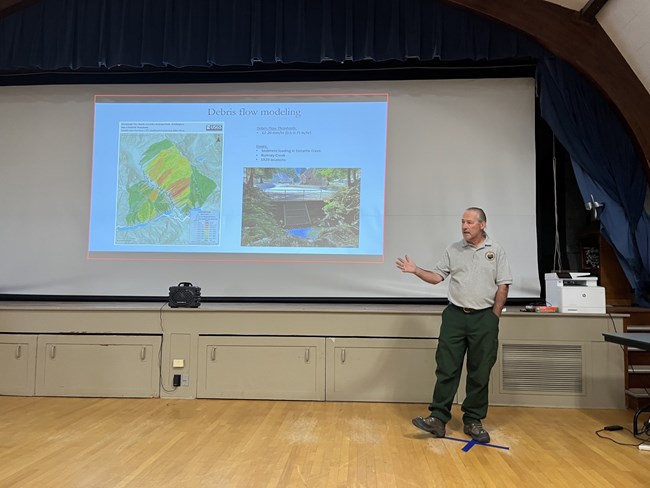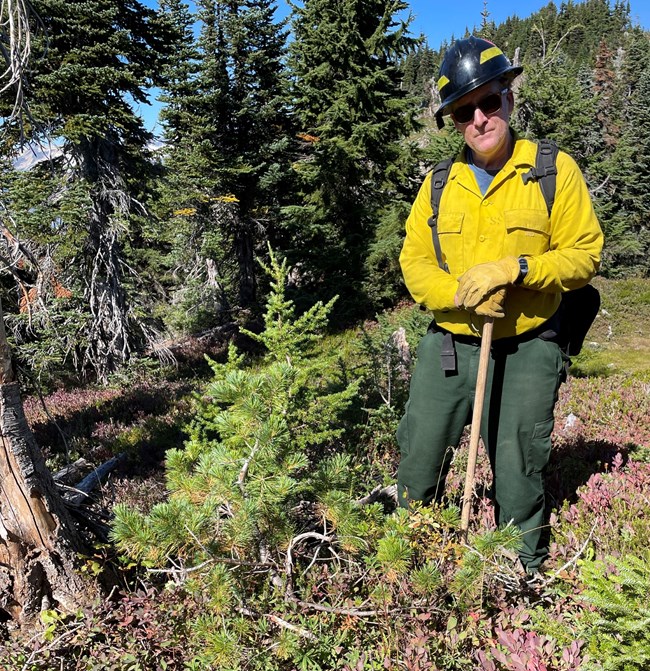Last updated: August 12, 2025
Article
BAER Response: Sourdough Fire Team Members

NPS
Jack retired after a long career with the National Park Service (NPS), most recently as the Chief of Natural and Cultural Resources at the North Cascades National Park Service Complex. Jack discovered BAER as he served multiple roles on fire assignments but yearned for deeper involvement. He wanted to contribute to a comprehensive wildfire management strategy that minimally impacted resource values on the land. He stumbled upon a BAER poster in an NPS office, and his involvement grew from there.
Cedar is passionate about what he does as an ecologist with the National Park Service’s Pacific West Region Office of Fire and Aviation Management. He has 20 years of experience working in wildland fire, with 13 of those spent leading the North Cascades National Park Fire Effects Monitoring Crew. Cedar was introduced to BAER during his time as a lead Resource Advisor (READ). In this role, he regularly collaborated with the BAER team on NPS wildland fire incidents. He enjoys the opportunity to research the effects of fire on natural and cultural resources across scale and time, especially as it applies to wilderness and large, old trees.
The establishment of a BAER team happens quickly. The team prepared a blueprint for the park to quickly address the potential threats to human life and property and the impacts of the fire on natural, cultural, and infrastructure resources after the Sourdough Fire. Each BAER incident is highly unique and requires specialists with specific skills. The Sourdough BAER team included scientists with specialties relevant to the incident at North Cascades National Park Service Complex including archeology, hydrology, botany, forestry, wildlife, fire ecology, and geo-spatial systems.
Once the team was assembled and assigned, Jack led the team on a daily basis. He oversaw field work, information analysis, summary assessment writing, and funding requests. In addition to leading the team, Jack completed recreation assessments. He evaluated the damage to trails and recreational facilities that had been caused by the fire itself, then determined policy-compliant costs to repair or replace those facilities. Due to the wilderness character of the park complex, he enjoyed hiking many miles of trails to understand how the infrastructure fared during the Sourdough Fire.

NPS
Cedar supported logistics, planning, administration, coordination, and communication for the team as the deputy lead. As the document specialist, he built and managed the BAER Plan and synthesized other information, documenting work, organizing data, solving problems, managing logistics, and writing technical reports. Though most of his work was in the office, he was able to provide subject-matter expertise in the field by collecting data on some of the affected tree species. He surveyed the Sourdough Ridge for fire impacts to whitebark pine, conducted a helicopter survey on Stetattle Creek, and surveyed old-growth forests for burn impacts.
North Cascades National Park Service Complex has a tremendous diversity of plants, ecotones, and wildlife that can be impacted by wildfires. The BAER program brings in a team of specialists like those on the 2023 Sourdough Fire BAER team to assess the need for effective post-fire stabilization measures to protect human life, property, and critical natural and cultural resources. The team met with the park management team to identify values at risk from direct fire impacts or conditions following the fire. After spending time in the filed making assessments, compiling data, and talking with park specialists, they made recommendations on specific immediate actions needed.
Jack and Cedar encourage others to learn the science of how an ecosystem will respond to fire, and how and why land managers must find ways to mitigate some fire effects or mitigate the negative consequences that follow a fire.
